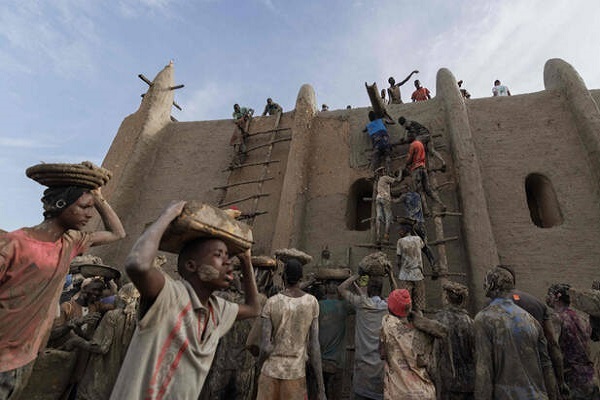Malians Replaster Historic Djenne Mosque in Annual Preservation Tradition

Amid the rhythm of drums and celebratory music, community members on Thursday applied a fresh layer of mud plaster to the mosque, which features three prominent minarets and is recognized globally as a symbol of Sahelian architecture.
The event, held ahead of the region’s intense rainy season, involves coating the structure with banco—a traditional mixture of earth and water—to protect it from erosion. “This mosque belongs to the whole world,” said Aboubacar Sidiki Djiteye, his face covered in mud as he took part in what he described as a “unifying” activity. “There’s no bigger event in Djenne than this,” he told AFP.
The annual tradition is deeply rooted in local heritage. “Replastering the mosque is a tradition handed down from generation to generation,” explained Bayini Yaro, one of the women responsible for fetching water for the mixture.
Residents prepared the protective coating by blending water with local materials such as earth, rice bran, shea butter, and baobab powder. These components are key to maintaining the mosque's distinct architectural style, typical of the Sahel-Sudanese region.
Read More:
Chief mason Mafoune Djenepo oversaw the application of the new plaster. “The importance of this mosque is immense. It’s the image on all Malian stamps,” he noted.
Following the work, a blessing ceremony was held in the mosque’s courtyard. Participants recited verses from the Quran and later shared dates and sweets in a communal gathering.
Originally constructed in the 13th century and rebuilt in 1907, the mosque is regarded by UNESCO as the world’s largest earthen building. Djenne, a city of roughly 40,000 people known for its distinctive banco houses, was designated a UNESCO World Heritage site in 1988.
However, the site was placed on UNESCO’s endangered list in 2016 due to ongoing instability in central Mali, where armed groups affiliated with Al-Qaeda, the Islamic State group (Daesh), ethnic militias, and criminal networks have been active since 2012.
Source: Agencies



